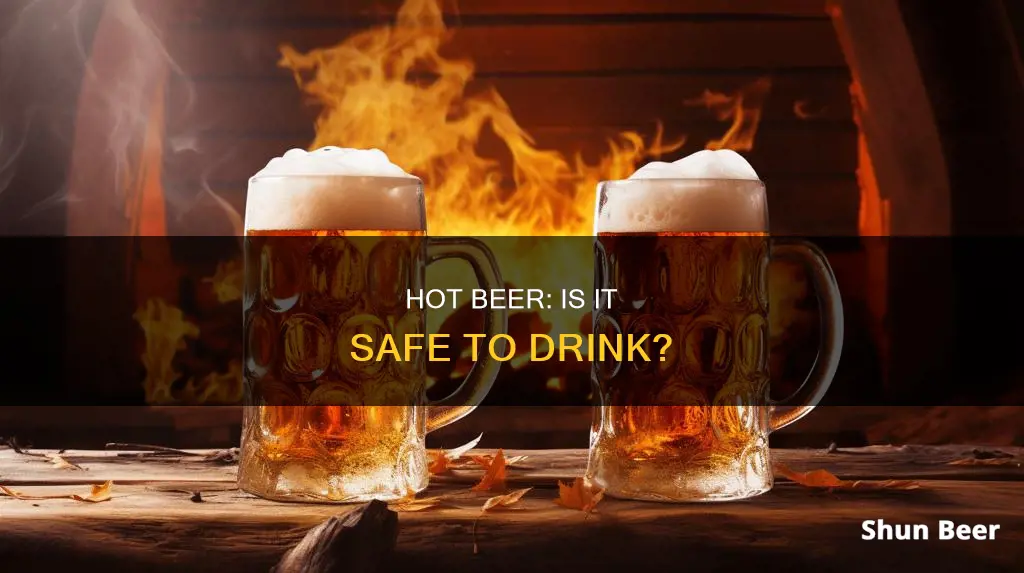
Many people have different preferences when it comes to drinking beer. Some like it chilled, while others prefer it at room temperature. But what happens when a cold beer is left out and gets warm? Can you put it back in the fridge and drink it later? This is a common question, and the answer may surprise you.
What You'll Learn

Heat will shorten a beer's life, but it won't spoil it
Heat will not make a beer go bad, but it will shorten its lifespan. Exposure to high temperatures for extended periods will accelerate the ageing process, causing the beer to oxidise more rapidly and develop off-flavours. This is because heat increases the rate of the chemical reaction between the beer and oxygen, resulting in oxidation. This oxidation causes a stale, cardboard-like taste.
However, occasional exposure to heat, such as during a long car ride on a warm day, will not ruin the beer. Beer can sustain fluctuations in temperature without spoiling. Beer is often transported and stored in varying temperatures before it reaches the consumer, and it can withstand these temperature changes.
To preserve the freshness and flavour of beer, it is best to store it in a cool, dark place. Refrigeration slows down the oxidation process and protects the beer from exposure to light, which can cause "skunking". While temperature cycling does not "skunk" beer, exposure to warm temperatures can affect its flavour in a matter of days.
In summary, while heat will shorten a beer's lifespan and affect its flavour, it will not spoil the beer. Beer can withstand temperature changes, and proper storage in a cool, dark place will help maintain its freshness and flavour.
Does Open Beer Go Bad? Drinking It the Next Day
You may want to see also

Fluctuations in temperature do not affect beer
Temperature fluctuations are not great for beer, as the closure is impacted by temperature changes, and if the temperature fluctuates enough times during the life of a particular bottle, the closure will start to loosen, and that means oxygen can get in, breaking down the beer and making it go flat.
However, it is worth noting that even exposure to moderate heat, like keeping a case of beer in a garage, will not be the deciding factor on whether the beer is ruined or not. Beer can sustain fluctuations in temperature without spoiling.
In addition, while heat will shorten the life of a beer, it does not make it go bad, spoil it, or skunk it in the short term. Extended exposure to elevated temperatures will accelerate aging and oxidation, contribute to off-flavours, and reduce the beer's drinkability.
Beer Drinking: How Much is Too Much?
You may want to see also

Beer exposed to heat for extended periods will oxidise
Introducing heat for an extended period of time will cause the beer to oxidise more rapidly. Refrigeration slows down that oxidation process. In addition, refrigerators protect their contents from sunlight, preventing lightstrike, or exposure to too much natural light.
Light-struck beer can taste skunked, musty, and pungent. Dark brown bottles provide some barrier to UV rays, but even they can fall victim to extended light exposure. Lighter-coloured and clear bottles are especially at risk of becoming skunked if they are not kept away from natural light.
While no beer benefits from being skunked, some beer can produce mellower, richer, more complex aromas if allowed to age. Oxidation will occur during this aging process, but if aged gently, this oxidation can supply spicy and dried fruit qualities. Hot maturation can produce notes of toasted nuts, caramel, or orange zest, similar to maderisation in wine.
There is not one specific temperature threshold at which beer will instantly taste stale. Instead, that is determined by a combination of temperature and time. Beer stored outside of a refrigerator has an accelerated ticking clock on its freshness.
Drinking Beer Post-Durian: Safe or Risky?
You may want to see also

Beer should be stored in a cool, dark place
Beer is best stored in a cool, dark place. This is because several factors can cause beer to spoil, and a cool, dark place helps to mitigate these factors.
Firstly, exposure to sunlight can cause beer to spoil. The sun's UV rays create a chemical reaction in the beer, breaking down its flavour components until it smells and tastes like skunk spray. This is why beer that has been exposed to sunlight for too long is said to have been "skunked" or "lightstruck". Therefore, storing beer in a cool, dark place helps to prevent this from happening.
Secondly, exposure to oxygen can also cause beer to spoil. Bottled beer is at a higher risk of exposure to oxygen than canned beer, and storing beer upright minimises contact with the air. Keeping bottled beer on its side makes it prone to air leaks, which can cause the beer to spoil.
Thirdly, heat can also cause beer to spoil. While heat will not make beer go bad in the short term, extended exposure to elevated temperatures will accelerate aging and oxidation, contribute to off-flavours, and reduce the beer's drinkability. Therefore, storing beer in a cool place helps to slow down the oxidation process and preserve the freshness of the beer.
In summary, storing beer in a cool, dark place helps to prevent exposure to sunlight, oxygen, and heat, all of which can cause beer to spoil. By storing beer in a cool, dark place, you can help ensure that your beer remains fresh and flavourful for as long as possible.
Beer Before Workout: Good or Bad Idea?
You may want to see also

Beer exposed to heat will not make you sick
Introducing heat for an extended period will cause the beer to oxidise more rapidly and lead to off-flavours. Refrigeration keeps this process at bay for a longer period of time than storing at room temperature or warmer.
Oxidation causes a stale, cardboard-like taste to the beer. Refrigeration slows down that oxidation process. Storing beer in a cool, dark space not only slows oxidation but prevents lightstrike, or exposure to too much natural light. Light-struck beer can taste skunked—musty and pungent—as a result.
It is a myth that temperature cycling "skunks" beer. Beer can sustain fluctuations in temperature without spoiling. It is, however, best preserved when kept cold. Keeping beer at room temperature can drop a beer's shelf life from nearly six months to only a few weeks, and exposing the same beer to very warm temperatures can affect its flavour in a matter of a couple of days.
The Magic Behind Draft Beer: Bar System Explained
You may want to see also
Frequently asked questions
Yes, you can. While heat will shorten the life of a beer, it does not make it go bad, spoil it, or skunk it in the short term.
No, it is a worldwide myth that temperature cycling "skunks" beer. Beer is shipped from all over the world and is subject to temperature changes, yet non-skunked imported beer is still available.
Extended exposure to elevated temperatures will accelerate aging and oxidation, contribute to off-flavors, and reduce the beer's drinkability.
Beer is best preserved when kept cold. Refrigeration slows down the oxidation process and protects the beer from exposure to sunlight, which can cause lightstrike or skunking.
Fluctuations in temperature do not spoil the beer. It would take many cycles of cooling and warming to have an appreciable effect on the beer.







